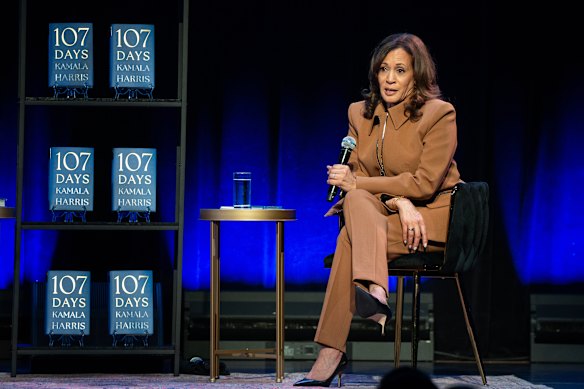
In an event at the Town Hall Theatre in Midtown Manhattan on Wednesday night, Kamala Harris received two standing ovations before beginning her remarks. However, the atmosphere outside was charged, as pro-Palestine protesters disrupted the event, their drumming audible during the latter half of the hour-long discussion. Earlier in the evening, demonstrators had interrupted the session, vocally accusing Harris of complicity in violence against Palestinians. The crowd responded by shouting down the protestors, who were eventually removed.
During this event, Harris discussed her new book, 107 Days, which recounts her short-lived presidential campaign. She described her candidacy as having faced significant obstacles from the outset, positioning her main challenge as a lack of time. Harris noted that her campaign was the shortest in American history, having been launched after Joe Biden suspended his re-election bid in July 2024.
Addressing Democratic Divisions
While Harris’s narrative focuses on the constraints of time, it also raises broader questions about the Democratic Party’s strategic decisions. Critics have questioned whether Harris was the right candidate and why Biden was allowed to remain in the race for so long despite declining popularity. These issues reflect deep divisions within the party that contributed to her unsuccessful bid against Donald Trump.
A pivotal moment in Harris’s campaign occurred during an appearance on The View, where co-host Sunny Hostin asked her how she would differ from Biden. Harris’s hesitant response, “There is not a thing that comes to mind,” was later exploited by the Trump campaign to illustrate her alignment with the president. In her book, Harris describes this moment as akin to pulling the pin on a hand grenade, suggesting that it significantly harmed her position.
Harris argues that those closest to Biden should have advised him against seeking re-election, indicating a disconnect within the party leadership. This internal struggle highlights the ongoing challenges Democrats face as they attempt to unify and present a cohesive front to the electorate.
Reflections on Leadership and Future Challenges
As she reflects on her campaign, Harris emphasizes the need for clarity and distinction in political messaging. The complexities of her candidacy and the surrounding protests illustrate the precarious nature of political leadership today. The tension evident both inside and outside the theatre serves as a reminder of the challenges that await the Democratic Party moving forward.
Ultimately, Harris’s narrative in 107 Days not only recounts her personal experiences but also sheds light on the broader dynamics at play within American politics. As she continues to engage with the public, her story underscores the importance of addressing internal divisions while striving for a unified vision in future campaigns.







